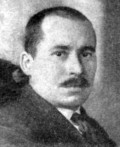| Alexandr Červjakov joined the Russian Communist Party in May 1917 and participated in the Bolshevik coup in Petrograd. He was one of the founding fathers and leaders of the Belorussian social democratic workers' party. In Feb. 1918, Červjakov became a commissar for the Belorussian affairs under the Russian SFSR people's commissariat for nationalities. On 1 Jan 1919, Červjakov along with other five members of the Provisional Workers' and Peasants' Soviet Government signed the Manifest on proclamation of the Belorussian Socialist Soviet Republic. During this short-lived Soviet regime in Belorussia, Červjakov briefly served as people's commissar for education. When the Soviet power in Belorussia was reinstated in 1920, Červjakov was appointed chairman of the Military Revolutionary Committee of Minsk and then of the Belorussian Socialist Soviet Republic. As chairman of the Central Executive Committee and the Council of People's Commissars of Belorussian SSR (18 Dec 1920 - 17 Mar 1924), he was involved in creation of the Soviet Union. The first session of the USSR Central Executive Committee elected him on 30 Dec 1922, one of its chairmen along with Mihail Kalinin, Grigorij Petrovskij and Nariman Narimanov. In 1924, Červjakov left the office of the Belorussian prime minister, but retained chairmanship in the Belorussian Central Executive Committee (18 Dec 1920 - 16 Jun 1937). Červjakov represented the Belorussian communists at seven party congresses in Moscow, but he never was elected to the party Central Committee. Červjakov was severely criticized at the 16th congress of the Communist Party of Belorussia in June 1937 for insufficient efforts in extermination of the enemies of the people. Červjakov was found shot to death in his working room during the break between the congress' meetings on 16 Jun 1937. The press reported that he committed suicide "on personal family grounds." Biography source: [3, p. 584] |

